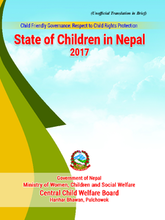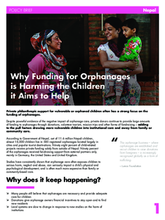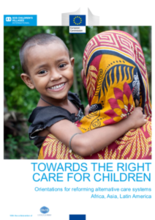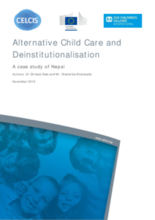This country page features an interactive, icon-based data dashboard providing a national-level overview of the status of children’s care and care reform efforts (a “Country Care Snapshot”), along with a list of resources and organizations in the country.
demographic_data
childrens_living_arrangement
children_living_without_bio
adoption
social_work_force
key_stakeholders
Key Stakeholders
Add New DataOther Relevant Reforms
Add New Datadrivers_of_institutionalisation
Drivers of Institutionaliziation
Add New Datakey_research_and_information
Key Data Sources
Add New DataAct Relating to Children 2018 - Nepal
Trafficking in Persons Report June 2018
Country Care Review: Nepal
Acknowledgements
Data for this country care snapshot was contributed by Forget Me Not and UNICEF Nepal.
Displaying 61 - 70 of 140
This report from the Ministry of Women, Children and Social Welfare Central Child Welfare Board reviews the state of children and child rights in Nepal in 2017.
This policy brief from the Elevate Children Funders Group describes how private donors add to "the pull factors drawing more vulnerable children into institutional care and away from family or community care" in Nepal.
This infographic from the Elevate Children Funders Group describes how private donors add to the "pull factors drawing more vulnerable children into institutional care and away from family or community care."
The general objective of this study was to conduct a research on the possible issue of institutionalisation in six South and Central American, Asian and African countries in order to strengthen the knowledge of the European Commission on the nature, the extent and scope of institutionalisation and feasibility of de-institutionalisation (alternative care for children).
The report investigates why children are placed into alternative care, what types of alternative care are available in Nepal, what structures and processes govern alternative care, how the alternative care workforce are trained and supported, and what is and is not working in Nepal's current system. It concludes with recommendations for enhancing alternative care in the country.
This study attempts to understand the feelings and bonds of the often complex life situations of being an internationally adopted child.
Wer Waisenkindern in Nepal hilft, kann nichts falsch machen? Stimmt nicht. Viele Spender unterstützen ungewollt die Ausbeuter der Kinder.
In this talk, Emily Delap from Family for Every Child puts the use of orphanages in Nepal into a global context and explores the international evidence on the harm caused by allowing children to grow up away from families, and on the problems of orphanage voluntourism.
Next Generation Nepal Country Director Martin Punaks talks about orphanage trafficking in Nepal, why orphanage volunteers may inadvertently be part of the problem and how you can be part of the solution through ethical volunteering and other ways of "giving back."
A blog article discussing how Nepali families are routinely tricked into sending their children to badly run orphanages.





